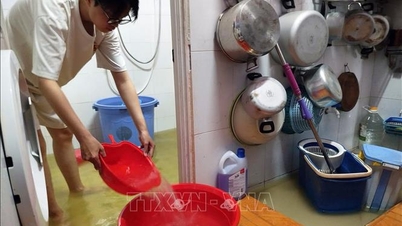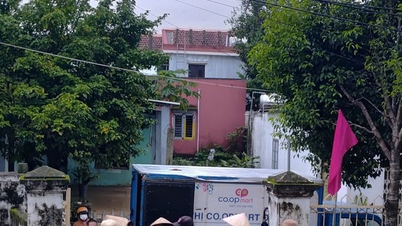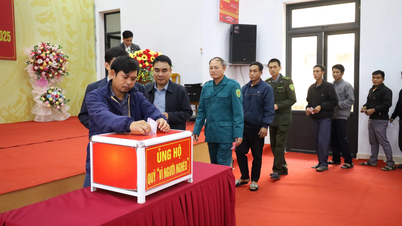Many opinions also proposed to maintain the current 7 personal income tax rates, raise the tax threshold, narrow the gap between the rates to ensure fairness; or to raise the taxable revenue threshold of business households; consider tax exemption for the sale of a single house and add a mechanism to deduct education and health care expenses to reflect the reality of people's lives.

Proposal to maintain 7 tax rates and raise tax threshold
Delegate Hoang Van Cuong (Hanoi Delegation) completely agrees with the direction of this amendment of the draft law. That is, not to specify the family deduction level in the law but to let the Government decide based on price fluctuations and people's income. This approach creates conditions for more flexible adjustment, reflecting the reality of life.
However, the Delegate said that the law needs to include clear principles on when and how to make adjustments. For example, the Government will make adjustments when there are fluctuations in prices or income.
Regarding the progressive tax schedule, Delegate Hoang Van Cuong said that the current personal income tax schedule consists of 7 levels, each level is 5% apart. The new draft law proposes to reduce it to 5 levels, with larger gaps between levels. This option is not reasonable.
Specifically, according to the draft, the tax rate jumps from 5% (under 10 million VND/month) to 15% (from 10 to 30 million VND/month). This is a sudden and unreasonable jump. Or from 30 to 60 million VND, the tax rate is 25%. Thus, the tax rate for an income of 31 million VND is equal to 59 million VND. Thus, workers who try to increase their income a little bit will have to pay a lot more tax.
Delegate Hoang Van Cuong proposed to maintain the current 7 tax rates, with a difference of 5% between each rate and the highest rate with a tax rate of 35% being 150 million VND. This tax rate ensures reasonable progression, encouraging workers to strive to increase their income without worrying about being "jumped" too quickly.
Delegate Tran Hoang Ngan (Ho Chi Minh City Delegation) also proposed to continue maintaining the 7 tax rates in the Progressive Tax Schedule as currently regulated. In addition, the Government should consider studying and supplementing regulations on essential expenses of people before calculating taxes, especially medical expenses and education expenses. This is consistent with Resolution No. 71-NQ/TW dated August 22, 2025 of the Politburo on breakthroughs in education and training development; Resolution No. 72-NQ/TW dated September 9, 2025 of the Politburo on a number of breakthrough solutions to strengthen the protection, care and improvement of people's health.
Delegate Tran Dinh Gia (Ha Tinh Delegation) also said that it is necessary to study and adjust in the direction of narrowing the gap between income levels for personal income tax calculation. Currently, the structure of tax levels and the gap between taxable income levels are still quite wide, leading to a situation where a group of taxpayers have small income levels but are subject to the same tax rate, reducing fairness according to the principle of "partial progressive tax" of the Personal Income Tax Law.
Practice shows that the income structure of workers is changing, living standards and living expenses are increasing significantly according to socio-economic fluctuations. Therefore, adjusting to narrow the gap between taxable income levels not only contributes to accurately reflecting the tax payment capacity of each group of subjects, ensuring the goal of fairness in income regulation, but also complies with the requirements of current tax policy reform. At the same time, this adjustment will create more favorable conditions for taxpayers in forecasting financial obligations, limiting unreasonable tax pressure and contributing to improving the level of compliance with tax laws.
Regarding family deductions, Delegate Tran Dinh Gia proposed to study and add the case of children "losing civil act capacity" and amend the content in the direction of: "Children who are minors; children with disabilities; children who have lost civil act capacity and are unable to work". This addition is to ensure full coverage of dependents that taxpayers are obliged to support, in accordance with the provisions of the Civil Code on civil act capacity as well as the principle of protecting vulnerable subjects in tax law.
In reality, there are cases where children have reached adulthood but have lost their civil capacity according to the Court's decision, leading to the inability to work to generate income to ensure the minimum needs for life. If we only limit the dependents to the groups of "minor children" and "disabled children" without adding the case of loss of civil capacity, we may miss a group that actually needs support, not reflecting the true nature of the taxpayer's obligation to care for and raise them.
The above adjustment is also consistent with the personal income tax policy goal of ensuring fairness and sharing the financial burden with families in difficult circumstances, thereby contributing to implementing social security policies and protecting vulnerable groups according to the State's orientation, said Delegate Tran Dinh Gia.
Income tax for business households needs to be fairer
Regarding income tax for individual business households, Delegate Hoang Van Cuong said that determining it based on revenue is unreasonable, because revenue does not accurately reflect actual income.
The delegate gave an example: a milk business has a revenue of 200 million VND, but after deducting the cost of importing goods, the actual profit is only about 10 million VND - this level should clearly not be subject to tax. On the contrary, a hairdresser has a similar revenue but very low costs, the actual income can be up to 150 million VND - this is the appropriate subject to pay income tax.
According to Delegate Hoang Van Cuong, calculating tax on business households with revenue from 200 million VND is unfair. Therefore, calculating tax based on income and classifying business groups will be fairer.
Regarding this issue, Delegate Tran Hoang Ngan (Ho Chi Minh City Delegation) said that according to the draft, individual business households with revenue of 200 million VND/year or more will have to pay personal income tax, which is not appropriate.
Delegate Tran Hoang Ngan calculated that if calculated according to the new deduction level of 15.5 million VND/month for taxpayers, that is 186 million VND/year. A household with a revenue of 200 million VND/year, after deducting expenses, will have almost no taxable income left.
Delegates proposed raising the taxable revenue threshold of individual business households to at least 300 or 400 million VND/year, to ensure compatibility with the current family deduction level and to match actual business costs.
Proposed tax exemption for sole home sellers
Commenting on income tax from real estate transfer, Delegate Hoang Van Cuong said that currently, personal income tax from real estate transfer is 2% of the transfer value. This is an unreasonable calculation because it does not distinguish between people who sell their house to buy a new house and speculators who buy and resell.
According to the Delegate, people who sell their only house to move to another place, have to pay 2% personal income tax and an additional 0.5% registration fee when buying a new house is very unreasonable. Because this is a legitimate need, not for business purposes, it should be exempted from tax.
On the contrary, for those who buy and sell frequently, profiting from price differences, higher taxes should be imposed to limit real estate speculation. Vietnam already has a land and real estate database system, so it is completely possible to monitor and classify speculative transactions, Delegate Hoang Van Cuong pointed out.
Source: https://baotintuc.vn/kinh-te/linh-hoat-muc-giam-tru-gia-canh-theo-bien-dong-gia-ca-va-thu-nhap-20251105192300419.htm








































![[Photo] Opening of the 14th Conference of the 13th Party Central Committee](https://vphoto.vietnam.vn/thumb/1200x675/vietnam/resource/IMAGE/2025/11/05/1762310995216_a5-bnd-5742-5255-jpg.webp)














































































Comment (0)